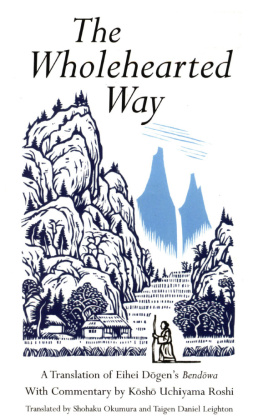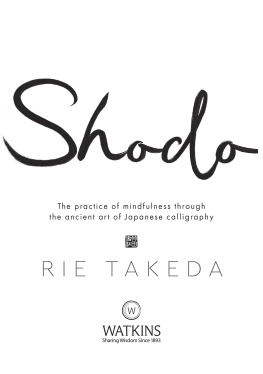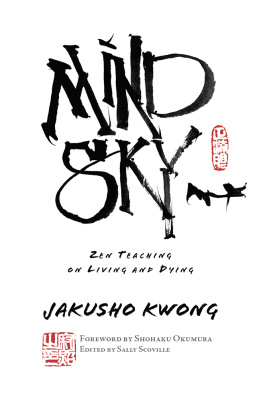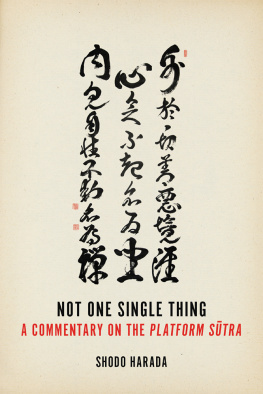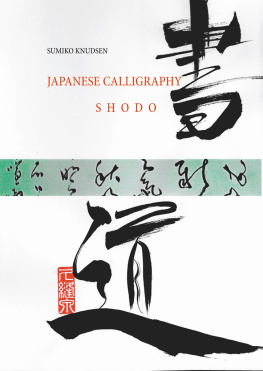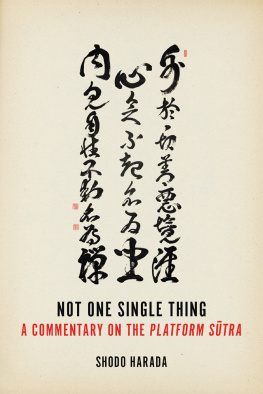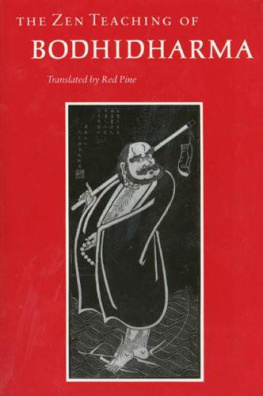Shodo Harada Roshi - Path to Bodhidharma, The
Here you can read online Shodo Harada Roshi - Path to Bodhidharma, The full text of the book (entire story) in english for free. Download pdf and epub, get meaning, cover and reviews about this ebook. genre: Religion. Description of the work, (preface) as well as reviews are available. Best literature library LitArk.com created for fans of good reading and offers a wide selection of genres:
Romance novel
Science fiction
Adventure
Detective
Science
History
Home and family
Prose
Art
Politics
Computer
Non-fiction
Religion
Business
Children
Humor
Choose a favorite category and find really read worthwhile books. Enjoy immersion in the world of imagination, feel the emotions of the characters or learn something new for yourself, make an fascinating discovery.
- Book:Path to Bodhidharma, The
- Author:
- Genre:
- Rating:3 / 5
- Favourites:Add to favourites
- Your mark:
- 60
- 1
- 2
- 3
- 4
- 5
Path to Bodhidharma, The: summary, description and annotation
We offer to read an annotation, description, summary or preface (depends on what the author of the book "Path to Bodhidharma, The" wrote himself). If you haven't found the necessary information about the book — write in the comments, we will try to find it.
Path to Bodhidharma, The — read online for free the complete book (whole text) full work
Below is the text of the book, divided by pages. System saving the place of the last page read, allows you to conveniently read the book "Path to Bodhidharma, The" online for free, without having to search again every time where you left off. Put a bookmark, and you can go to the page where you finished reading at any time.
Font size:
Interval:
Bookmark:
The Path to Bodhidharma
The Teachings of Shodo Harada Roshi
Table of Contents
-Zazen
-Hakuin and His Song of Zazen
-Sesshin
-Enlightenment
-Work and Society
-Kobe, January 1995
-Questions and Answer
-Glossary
Preface
Shodo Harada, the abbot of Sogenji, a three-hundred-year-old Rinzai Zen Temple in Okayama, Japan, is the Dharma heir of Yamada Mumon Roshi (1990-1988), one of the great Rinzai masters of the twentieth century. Harada Roshi offers his teachings to everyone, ordained monks and laypeople, men and women, young and old, from all parts of the world. His students have begun more than a dozen affiliated Zen groups, known as One Drop Zendos, in the United States, Europe, and Asia.
The material that follows was gathered from the newsletters Harada Roshi has prepared for his students, from public talks and talks given during sesshin (one week of continuous zazen with breaks only for sutras, eating, and sleeping), and from his answers to questions posed by his students. It is not an academic text but an invitation to practice, compiled from material presented directly to students of all levels of experience. No transcription of the Roshis words can capture the immediacy of his presence or the full measure of his compassion, but I hope that the simple and straightforward essence of his teaching will hereby made available to every one.
Many words from Japanese and other languages for which there are no precise English equivalents are used in the discussion of Zen. Words that are used here only once are defined where they occur; those that appear more than once are given in italics on their appearance and explained in the Glossary. Many of these words would be rendered with diacritical marks in their original language; for ease of usage, and because many of the terms are finding their way into English without diacritical marks, such have been dispensed with here. The names of sutras are given in their most commonly used English form. The names of the Zen ancestors are given in their Japanese forms, as the Roshi speaks them; for the Chinese patriarchs, the Wade-Giles forms of their names are provided in the Glossary.
Many, many people have contributed to this volume. First and foremost. Priscilla Daichi Storandt, in addition to being always at hand to translate the Roshis words, offered constant and enthusiastic support. Mitra Bishop transcribed tapes, edited many of the newsletters incorporated herein, reviewed drafts of the manuscript, and also provided unfailing encouragement. Thomas Kitchner provided additional translations for and careful editing of the Zazen
chapter and answered my many questions with good and humor and vast knowledge.
Tony Dairyo Fairbank and Jim Whitehill made available copies of material in this book; Doyu Albin and Shonen Bressler translated passages; an Chozen Bays offered advice and Guidance; and Breanda Wajun Loew, Lee Paton, Roy Tribelhorn, Eunice Nakao, Domyo, and the many others whom I know only as voice on tapes asked the questions that appear in the final section.
Last but not least, I owe a personal dept of thanks to Tim Jundo Williams, for his constant love and support, and for having encouraged me to go to Japan and meet Shodo Harada Roshi.
Bodhidharmas Outline of Practice
There are many avenues for entering the Way, but essentially they are all of two kinds: entering through the Principle and entering through practice.
Entering through the Principle is awakening to the essential by means of the teachings. It requires a profound trust that all living beings, both enlightened and ordinary, share the same true nature, which is obscured unseen due to only mistaken perception. If you turn from the false to the true, dwelling steadily in wall contemplation, there is no self or other, and ordinary people and sages are one and the same. You abide unmoving and unwavering, never again confused by written teachings. Complete, ineffable accord with the Principle is without discrimination, still, effortless.
This is called entering through the Principle.
Entering through practice refers to four all-encompassing practices: the practice of requiting animosity, the practice of accepting ones circumstances, the practice of craving nothing, and the practice of accord with the Dharma.
What is the practice of requiting animosity? When experiencing suffering, a practitioner of the Way should reflect: For innumerable eons, I have preferred the superficial to the fundamental, drifting through various states of existence, creating much animosity and hatred, bringing endless harm and discord. Though I have done nothing wrong in this life, I am reaping the natural consequences of the past offenses, my evil karma. It is not meted out by some heavenly agency. I accept it patiently and with contentment, utterly without animosity or complaint. A sutra says, When you encounter suffering, do not be distressed. Why? Because your consciousness opens up to the fundamental.
Cultivating this attitude, you are in accord with the Principle, advancing on the path through the animosity. Thus it is called the practice of requiting animosity.
Second is the practice of accepting circumstances. Living beings, having no [fixed] self, are entirely shaped by the impact of circumstances. Both suffering and pleasured by circumstance. If you experience such positive rewards as wealth and fame, this results from past causes. You receive the benefits now, but as soon as these circumstances are played out, it will be over. Why should you celebrate? Success and failure depend upon circumstances, while the Mind does not gain or lose. Not being moved even by the winds of the good fortune is ineffable accord with the Way.
Thus it is called the practice of accepting ones circumstances.
Third is the practice of craving nothing. The various sorts of longing and attachment that people experience in their unending ignorance are regarded as craving. The wise awaken to the truth, going with the Principle rather than with conventional ideas. Peaceful at heart, with nothing to do, they change in accord with the seasons. All existence lacking substance, they desire nothing. [They know that] the goddesses of good and bad fortune always travel as a pair and that the Triple Word, where you have lived so long, is like a burning house. Suffering inevitably comes with having a body --- who can find peace? If you understand this fully, you quit all thoughts of others states of being, no longer crave them. A sutra says, To crave is to suffer; to crave nothing is bliss. Thus we understand clearly that craving nothing is the true practice of the Way.
Fourth is the practice of accord with the Dharma. The principle of essential purity is the Dharma. Under this principle, all form is without substance, undefilable, and without attachment, neither this not that. The Vimalakirti Sutra says,
In this Dharma, there are no living being because it transcends the defiling [concept] if living beings. In this Dharma, there is no self because it transcends the defiling [concept] of self. When the wise embrace and understand this principle, they are practicing accord with the Dharma. Since in the Dharma there is fundamentally nothing to withhold,
[the wise] practice generosity, giving their bodies, lives, and possessions without any regret in their minds. Fully understanding the emptiness of giver, gift, and recipient, they do not fall into bias or attachment. Ridding themselves of all defilements, they aid in the liberation of living beings without grasping at appearances. In this way they benefit themselves and others both, gracing the ay of Enlightenment. In the same fashion, they practice the other five perfections. To eliminate false thinking in practicing the six perfections means having no thought of practicing them.
Next pageFont size:
Interval:
Bookmark:
Similar books «Path to Bodhidharma, The»
Look at similar books to Path to Bodhidharma, The. We have selected literature similar in name and meaning in the hope of providing readers with more options to find new, interesting, not yet read works.
Discussion, reviews of the book Path to Bodhidharma, The and just readers' own opinions. Leave your comments, write what you think about the work, its meaning or the main characters. Specify what exactly you liked and what you didn't like, and why you think so.


